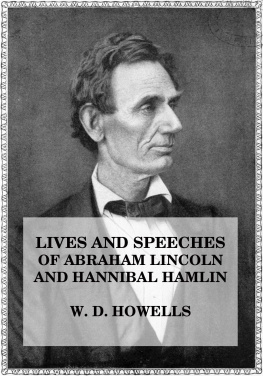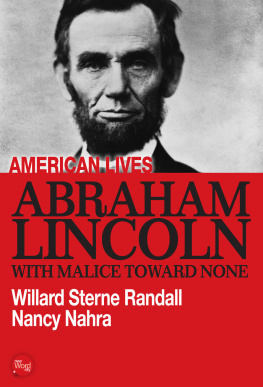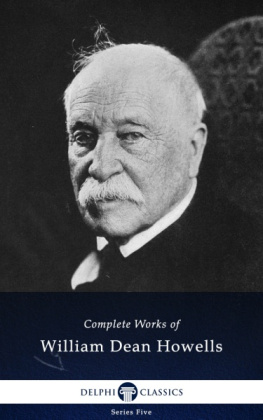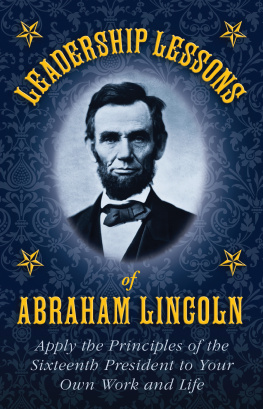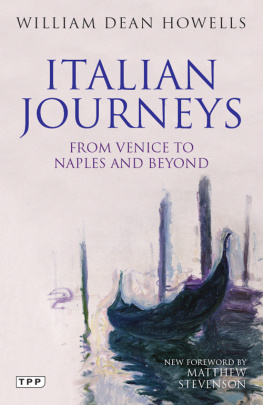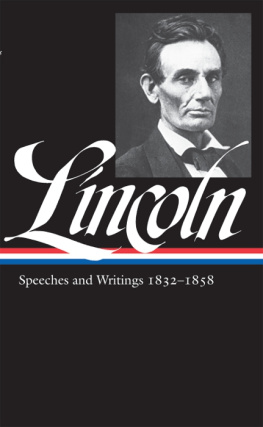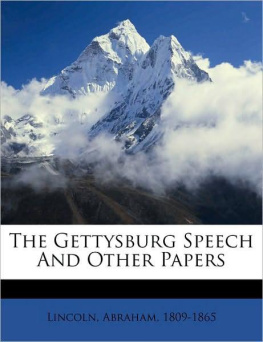LIFE OF ABRAHAM LINCOLN.
BY W. D. HOWELLS.
PREFACE.
WHEN one has written a hurried book, one likes to dwell upon the fact, that if the time had not been wanting one could have made it a great deal better.
This fact is of the greatest comfort to the author, and not of the slightest consequence to anybody else.
It is perfectly reasonable, therefore, that every writer should urge it.
A work which seeks only to acquaint people with the personal history of a man for whom they are asked to cast their votes-and whose past ceases to concern them in proportion as his present employs them-will not be numbered with those immortal books which survive the year of their publication.
It does not challenge criticism; it fulfills the end of its being if it presents facts and incidents in a manner not altogether barren of interest.
It is believed that the following biographical sketch of ABRAHAM LINCOLN will be found reliable. The information upon which the narrative is based, has been derived chiefly from the remembrance of MR. LINCOLN'S old friends, and may, therefore, be considered authentic. It is hardly necessary to add, that no one but the writer is responsible for his manner of treating events and men.
CHAPTER I.
IT is necessary that every American should have an indisputable grandfather, in order to be represented in the Revolutionary period by actual ancestral service, or connected with it by ancestral reminiscence. Further back than a grandfather few can go with satisfaction. Everything lies wrapped in colonial obscurity and confusion; and you have either to claim that the Smiths came over in the Mayflower, or that the Joneses were originally a Huguenot family of vast wealth and the gentlest blood; or that the Browns are descended from the race of Powhattan in the direct line; or you are left in an extremely embarrassing uncertainty as to the fact of great-grandparents.
We do not find it profitable to travel far into the past in search of Abraham Lincoln's ancestry. There is a dim possibility that he is of the stock of the New England Lincolns, of Plymouth colony; but the noble science of heraldry is almost obsolete.in this country, none of Mr. Lincoln's family seems to have been aware of the preciousness of long pedigrees, so that the records are meagre. The first that is known of his forefathers is that they were Quakers, who may have assisted in those shrewd bargains which honest William Penn drove with the Indians, for we find them settled at an early day in the old county of Berks, in Pennsylvania, where doubtless some of their descendants yet remain.
Whether these have fallen away from the calm faith of their ancestors is not a matter of history, but it is certain that the family from which the present Abraham Lincoln derives his lineage, long ago ceased to be Quaker in everything but its devout Scriptural names. His grandfather, (anterior to whom is incertitude, and absolute darkness of names and dates,) was born in Rockingham county, Virginia, whither part of the family had emigrated from Pennsylvania; and had four brothers, patriarchally and apostolically named Isaac, Jacob, John, and Thomas; himself heading the list as Abraham Lincoln.
The descendants of Jacob and John, if any survive, still reside in Virginia; Thomas settled in the Cumberland region, near the adjunction of North Carolina, Tennessee, and Virginia, and very probably his children's children may there be found. Late in the last century, Abraham, with his wife and five children, removed from Rockingham to Kentucky, at a time when the border was the scene of savage warfare between the Indians and the whites, and when frontier life was diversified by continual incursions, repulsions, and reprisals, on one side and on the other. In one of these frequent invasions, Abraham Lincoln was killed by the Indians, who stole upon him while he was at work and shot him. There is historical mention made of an Indian expedition to Hardin county, Kentucky, in 1781, which resulted in the massacre of some of the settlers; but the date of Lincoln's death is fixed some three years later, and there is no other account of it than family tradition.
His wife, his three sons and two daughters survived him; but the dispersion of his family soon took place; the daughters marrying, and the sons seeking their fortunes in different localities. Of the latter, Thomas Lincoln, the father of Abraham Lincoln of to-day, was the youngest, and doubtless felt more severely than the rest the loss which had befallen them. They were poor, even for that rude time and country; and as a child, Thomas made acquaintance only with hardship and privation. He was a wandering, homeless boy, working when he could find work, and enduring when he could not. He grew up without education; his sole accomplishment in chirography being his own clumsy signature. At twenty-eight he married Lucy Hanks, and settled in Hardin county, where, on the 12th of February, 1809, ABRAHAM LINCOLN was born.
Lincoln's mother was, like his father, Virginian; but beyond this, little or nothing is known of her. From both his parents young Lincoln inherited an iron constitution and a decent poverty. From his father came that knack of story-telling, which has made him so delightful among acquaintances, and so irresistible in his stump and forensic drolleries. It is a matter of some regret that the information with regard to Thomas Lincoln and his wife is so meager. The information is, however, not altogether necessary to the present history, and the conjecture to which one is tempted would be as idle as impertinent. It is certain that Lincoln cherished, with just pride, a family repute for native ability, and alluded to it in after life, when he felt the first impulses of ambition, and began in earnest his struggle with the accidents of ignorance and poverty.
A younger brother of Abraham's died in infancy; and a sister, older than himself, married and died many years ago. With her he attended school during his early childhood in Kentucky, and acquired the alphabet, and other rudiments of education. The schooling which Abraham then received from the books and birch of Zachariah Riney and Caleb Hazel, (of pedagogic memory,) and afterward from Azel W. Dorsey, and one or two others in Indiana, amounted in time to nearly a year, and cannot be otherwise computed. It is certain, however, that this brief period limits his scholastic course. Outside of it, his education took place through the rough and wholesome experiences of border life, the promptings of a restless ambition, and a profound love of knowledge for its own sake. Under these influences, he has ripened into a hardy physical manhood, and acquired a wide and thorough intelligence, without the aid of schools or preceptors.
In the autumn of 1816, when Abraham was eight years old, his father determined to quit Kentucky. Already the evil influences of slavery were beginning to be felt by the poor and the non-slaveholders. But the emigration of Thomas Lincoln is, we believe, to be chiefly attributed to the insecurity of the right by which he held his Kentucky land; for, in those days, land-titles were rather more uncertain than other human affairs. Abandoning his old home, and striking through the forests in a northwesterly direction, he fixed his new dwelling-place in the heart of the " forest primeval" of what is now Spencer county, Indiana. The dumb solitude there had never echoed to the ax, and the whole land was a wilderness.

